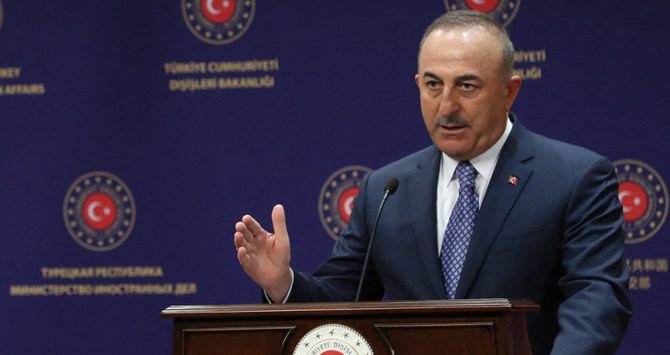https://arab.news/66w8k
- Bilateral relations strained in recent years by Muslim Brotherhood, Libya conflict and other matters
ANKARA: With Turkey hinting at a potential deal with Egypt on exclusive maritime zones in the gas-rich Eastern Mediterranean, the impact of such an agreement on energy transit routes and the political concessions that Turkey might be obliged to make have come under the spotlight.
Turkey’s Foreign Minister Mevlut Cavusoglu on Wednesday said that the country wanted to sign a deal over maritime boundaries.
But this willingness is currently limited to declarations from the Turkish side, with no tangible reaction from the Egyptians.
Turkey’s tactical move indicates a willingness to reduce escalatory policies in the region in order to bypass any criticism from Brussels and US President Joe Biden’s administration.
Potential sanctions against Turkey’s controversial exploratory activities in the Eastern Mediterranean would be discussed at the European Summit on March 25-26, pushing it to not make aggressive moves ahead of that meeting.
But experts regard such a deal to still be far-fetched, at least in the short-term, because Egypt has had an exclusive economic zone (EEZ) agreement with Greece since last year. This pact angered Turkey because it has had longstanding disagreements with Greece over the extent of their mutual continental shelves.
Egyptian President Abdel Fattah El-Sisi and Greek Prime Minister Kyriakos Mitsotakis had a phone call on Wednesday evening, after Cavusoglu’s statement, on regional issues of common interest, with a special emphasis on energy and Eastern Mediterranean issues, another strong signal that Greece would do its best to not let a Turkish-Egyptian rapprochement happen.
Turkey said the deal between Greece and Egypt did not include a disputed zone to the south of the Greek island of Kastellorizo which Turkey claims under its own EEZ.
Relations with Egypt have been strained after the Turkish-backed Mohammed Mursi, a member of the Muslim Brotherhood, was ousted by El-Sisi in 2013.
Last year, Egypt, Cyprus and Greece released a joint declaration accusing Turkey of carrying out “provocations” in the Eastern Mediterranean, and Egypt has been involved in the East Mediterranean Gas Forum since 2019 without involving Turkey.
Turkey and Egypt have also backed opposing sides in Libya’s civil war.
“Turkey has tried to lure Egypt into signing an EEZ agreement with it by claiming it will receive a bigger share than it will from a bilateral agreement between Athens and Cairo,” Gallia Lindenstrauss, a senior research fellow at the Institute for National Security Studies in Israel, told Arab News. “In a similar manner, it has presented the claim that the EEZ agreement between Israel and Cyprus gives Israel less than what it would receive had it signed an agreement with Turkey.”
While a relaxation in tensions between Turkey and Egypt was plausible, Lindenstrauss did not expect a serious rapprochement happening soon, so an EEZ agreement between the sides was not likely to materialize.
In late February, Egypt and Israel agreed on linking an Israeli offshore natural gas field to liquefied natural gas facilities in northern Egypt through an underwater pipeline to meet the increased demand for natural gas in Europe.
The pipeline will begin from Israel’s Leviathan gas field and then head to Egypt by land before going to Crete through the Greek-Egyptian EEZ.
This route sidesteps Cyprus. In other words, the gas is not likely to be exported through disputed areas that might draw Turkish objections.
Emre Caliskan, a research fellow at the UK’s Foreign Policy Centre, thought that Turkey’s recent efforts to improve its relations with Israel and Egypt was motivated by a need to break the alliance between Greece, Israel, Cyprus and Egypt.
“These countries have been united against Turkey’s increasing influence and gas searches in the Eastern Mediterranean,” he told Arab News. “From the Turkish policymakers’ strategic view, Greece and Cyprus interests are in contradiction with Turkey’s ambitions in the region. Therefore, Turkey will try to distance Greece and Cyprus from Egypt and Israel.”
These moves require a change in Turkey’s support to the Muslim Brotherhood ideology that inspires Hamas in order to bring Egypt onside and end the bilateral dispute. Turkey hosts several of the organization’s members and supporters since the group’s activities were banned in Egypt.
Last month, the Israeli Defense Ministry announced seizing goods worth $121,000 sent by Turkey-based Hamas members to individuals in the West Bank through two Turkish companies.
“We have recently heard claims that Turkey has been reassessing its ties with the Muslim Brotherhood and Hamas. It is too early to assess any policy change in relation to this. Any substantial reconciliation with Israel and Egypt will require Turkey to distance its relations with the Muslim Brotherhood,” Caliskan said.
For Caliskan, Turkey’s relations with the Muslim Brotherhood was based on ideology and also on a strategic partnership.
“Distancing Turkey’s relationship with the Muslim Brotherhood would impact Turkey’s influence in Libya for example. Turkey is likely to compartmentalize its relations with the Muslim Brotherhood, reducing its support to their presence in Egypt and Palestine, but will continue supporting them in North Africa, especially in Libya and Tunisia.”






